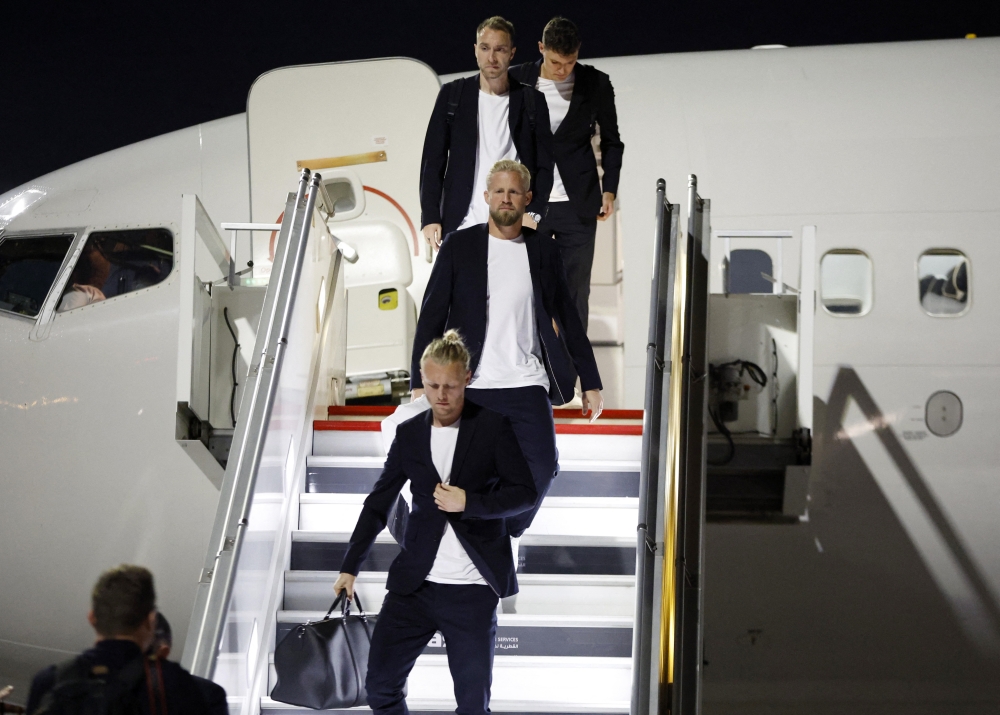Denmark has been at the forefront of a campaign criticising Qatar’s hosting of the FIFA World Cup.
Qatar has made “many improvements” within its legislation to better conditions for migrant workers in the country, the Danish Football Association chief said on Thursday, after months of scrutiny targeting the Gulf state’s hosting of the World Cup.
“I think one has to be honest that there’s been quite many improvements within Qatar legislation, and Amnesty International also reported that thousands of migrant workers actually have improved their conditions,” Jakob Jensen told Reuters.
“But I think it’s also fair to say we’re still pushing for more.”
“I think we’ve been able to make an impact on Qatar. It’s been done by very many actors, not just the associations, but also organisations and international governments,” he added.
Prior to their World Cup 2022 participation, Denmark had been outspoken against the violations of workers’ rights in Qatar, first by writing slogans on their training gear and more recently by darkening their team kits.
Some of the Danish players will also attend the major sporting event without their families in an act of protest.
Jensen further said that the Danish football would keep using its “appeal” to participate in other campaigns, reports said.
“I think that’s going to happen. I do think that other issues are pushing their way on to the football agenda and we are trying to embrace them as much as we can.”
“I believe in the power of football; I believe people can change the world,” he added.
Separately, the Danish national team was also denied a request by FIFA to train in shirts emblazoned with a political message during their time in Qatar for the World Cup.
Denmark had approached FIFA to allow its national team players to wear shirts imprinted with the words ‘Human Rights for All’, but has been rejected by global footballing body.
Western criticism
Authorities in Qatar denounced in late September Denmark’s move to ‘dim down’ its national team’s kits as “trivialising” the Gulf state’s “commitment to protect the health and safety of the 30,000 workers who built FIFA World Cup stadiums and other tournament projects.”
The statement was in response to Denmark’s unveiling of its national football kit for the World Cup – “toned down” jerseys to protest Qatar’s human rights record and support migrant workers in Qatar.
“We don’t wish to be visible during a tournament that has cost thousands of people their lives. We support the Danish national team all the way, but that isn’t the same as supporting Qatar as a host nation,” kit manufacturer Hummel announced in a statement earlier this year.
Since winning the bid to host the 2022 FIFA World Cup back in 2010, Qatar has come under incessant Western-heavy criticism over its human rights abuses, prompting senior Qatari officials to speak out.
In the lead up to the World Cup, a number of European nations, including England and Denmark, have raised issues over the plight of migrant workers in the host country, triggering calls to compensate employees.
The #PayUpFIFA campaign is a collective appeal by human rights groups for FIFA to match the tournament’s $440 million in prize money with compensation for migrant workers. This is a campaign to which, Qatar said it has already paid out hundreds of millions of dollars in unpaid wages.
The country’s Labour Minister Ali bin Samikh Al Marri said Qatar already has an existing fund to handle worker fatalities and injuries, dismissing the repetitive calls as a stunt.
“This money went to employees who were deprived of their wages and whose companies are now facing court cases, to employees who were injured at work or to cases of work-related deaths. This mechanism works very well. So why should we duplicate it?” he said.
‘Racist’ motives
As the tournament edges closer, Qatari officials have taken a more head on approach to call out criticism, highlighting apparent angles taken by western media that has widely disregarded progress made on the ground.
Last month, Qatar’s Amir Sheikh Tamim bin Hamad Al Thani said that “no other host nation” has faced this level of criticism.
“Since we won the honour of hosting the World Cup, Qatar has faced an unprecedented campaign that no other host nation has received. And we had handled it at first in good faith while considering some of the criticism positive and beneficial,” Sheikh Tamim told the Shura Council in October.
The amir added that while the criticism has helped Qatar “develop aspects that needed development”, it has continued to rear its ugly head.
“It soon became clear to us that the campaign has continued and expanded, and includes slander and double standards, until it has reached such a ferocity that many, unfortunately, wonder about the real reasons and motives behind it,” said Sheikh Tamim.
Speaking to Sky News earlier this month, Qatar’s Foreign Minister Sheikh Mohammed bin Abdulrahman Al Thani said critics of the World Cup in Qatar are “arrogant” and “cannot accept a small country from the Middle East”.
Similarly, the Chief Executive Officer of Qatar 2022 Nasser Al-Khater said “European countries feel they have monopoly over the World Cup.”
“Europe has hosted 11 tournaments out of 22 tournaments, of course it refuses that a country like Qatar or an Arab Muslim country hosts a tournament like the World Cup,” Al-Khater told Al Jazeera Arabic in a televised interview last week.
Addressing the scrutiny, Al-Khater said the anti-Qatar campaign has evolved over the past decade, with aims taken at Qatar size as a geographically small country to its hot summer climate.
“From the start, we have said that this tournament represents all Arabs and is for the entire Arab world, this increases our excitement and our sense of responsibility and increases determination to make this tournament a success,” said Al-Khater.







